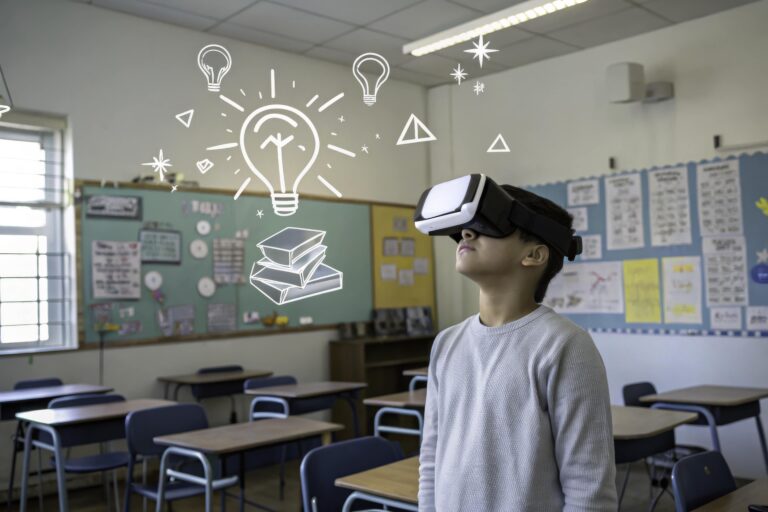Table of Contents
- Top Education Trends Shaping Classrooms by 2030
- Artificial Intelligence and Personalised Learning
- The Hybrid Learning Revolution
- Immersive Technology: Virtual and Augmented Reality
- Emphasis on Future-Ready Skills
- Green and Sustainable Schools
- Enhanced Inclusivity and Well-Being
- The Role of Teachers: From Information Givers to Facilitators
- Micro credentials and Lifelong Learning
The world of education is rapidly evolving, and by 2030, personalised learning, lifelong upskilling, and immersive technology will revolutionise how we teach and learn, preparing students for jobs and challenges we have yet to imagine.
Education across the globe is on the brink of a fundamental transformation. By 2030, classrooms and methods of teaching will change beyond anything we can now imagine.
From AI in teaching to collaboration and adaptive learning environments, classrooms will feel and look dramatically different from what we experience now.
In this blog, we explore the emerging trends and statistics destined to shape the educational landscape by 2030.
Top Education Trends Shaping Classrooms by 2030
Artificial Intelligence and Personalised Learning
Perhaps the most glaring trend is the incorporation of artificial intelligence (AI) in schools. AI-powered smart classrooms are being made to offer each student a customised learning experience.
The worldwide market for AI in learning is around USD 5.88 billion in 2024 and is anticipated to increase to USD 32.27 billion by the year 2030.
These smart systems will determine the strengths and weaknesses of every student, recommend appropriate resources, and help teachers create personalised lesson plans. Adaptive learning programs will displace the old “one-size-fits-all” method, ensuring that lessons advance at the optimal speed for every learner and attaining maximised outcomes for everyone.
Suggested: How Generative AI in Education: How AI is Changing Learning
The Hybrid Learning Revolution
The pandemic sped up educational innovation, propelling most schools towards hybrid or blended learning models. By 2030, hybrid education is expected to be the norm: classrooms will fuse in-person teaching with digital resources, providing flexibility and supporting learners from diverse backgrounds.
Cloud-based platforms and digital learning materials will enable pupils to access knowledge anytime, anywhere – closing gaps in opportunity and supporting lifelong learning.
Universities like those partnered with Exeed College are leading the way in offering quality education online, making advanced learning accessible across the globe.
Immersive Technology: Virtual and Augmented Reality
Learning will no longer be constrained within the four walls of a classroom. Virtual reality (VR) and augmented reality (AR) will provide immersive learning experiences, bringing abstract or faraway things to life.
A history lesson might involve a virtual visit to Ancient Rome, while science classes may allow students to walk “inside” the human body or manipulate molecules in 3D space. These technologies are predicted to drastically improve engagement and knowledge retention, while making complex subjects more accessible to all learners.
Emphasis on Future-Ready Skills
As the labour market is redefined through digitalisation and automation, educational institutions are focusing increasingly on life skills like problem-solving, critical thinking, teamwork, and emotional intelligence.
Curriculums are being reimagined to provide students not only with the academic skills but also with the creativity and adaptability skills required to succeed in tomorrow’s workplaces. The OECD’s Future of Education and Skills 2030 initiative highlights that student agency and well-being will be key competencies for the decade ahead.
Green and Sustainable Schools
Sustainability is climbing rapidly up the school agenda. By 2030, most schools will be green campuses, running on renewable energy, with sustainable materials and waste management.
Environmental stewardship and climate action will be part of a holistic approach through the curriculum, so that students can contribute to global sustainability issues.
Enhanced Inclusivity and Well-Being
Learning is headed toward an inclusive future. With the help of AI, accessibility technologies, and inclusive content, schools will provide students with disabilities with the same opportunities to thrive.
In addition, more awareness about mental health and well-being will make future classrooms incorporate mindfulness exercises, stress handling, and emotional quotient building into core curriculum components.
Read more: Why school counsellors are important in today’s education system
The Role of Teachers: From Information Givers to Facilitators
Even as technology brings sweeping change, the role of the teacher will remain indispensable. Rather than being displaced, teachers will serve as facilitators and mentors, mentoring students along their individual paths, nurturing creativity, and nourishing a classroom environment that encourages collaboration and well-being. Pedagogies will focus more on group work, problem-solving, and transdisciplinary thinking.
Teacher-centered vs Student-centered learning: Which is better?
Micro credentials and Lifelong Learning
Qualifications will be increasingly detailed and adaptable, replaced by micro credentials and “skill wallets” that break up the old, monolithic diplomas. Students will be able to draw on a verified portfolio of skills, shaped around their specific interests and the changing needs of the labour market. Discover how a PGCEI can advance your career.
Preparing for a Dynamic, Connected World
Education in 2030 will become more global. Global citizenship education and international virtual exchanges will enable students to work together across borders, gaining empathy, intercultural understanding, and feelings of shared responsibility for people and planet.
Learn more: Are teachers in demand in the UAE
Conclusion
By 2030, the classroom will have moved beyond space and time, influenced by accelerated technological innovation and fundamental changes in how and why we learn. These developing trends highlighted here reinforce the need for schools, governments, and communities to collaborate in developing an education system that is personalised, inclusive, sustainable, and future-ready.
With the right investment, vision, and commitment, the classrooms of 2030 won’t just prepare students to adapt – they will empower them to shape a better, more connected world.
You might be interested: Common teaching mistakes and how to fix them






